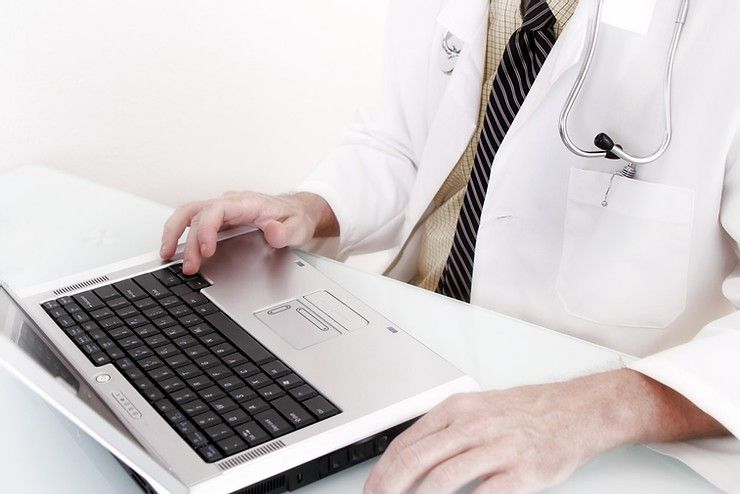This is a guest blog by a medical applicant: Matthew Pirie
In the 21st century of today, our daily lives are drastically different to that of our predecessors. We shop online, have face-to-face conversations with relatives 100 miles away, and store information in ‘the cloud’ - greatly contrasting with the ’clouds’ known a decade before now. Yet one thing that was omitted from this revolution of modernisation, is the rather mundane trips to the GP surgery; the word surgery only highlighting the overcomplicated and expensive nature of each trip. Thus leaving the question, with the drastic changes occurring during the unprecedented COVID-19 outbreak, is now the time to swap the practices, for an app?
To put this argument in perspective, GP surgeries will never be completely eradicated from society as they provide vital care such as minor surgery, vaccinations, and post-op dressing changes, that simply cannot be done digitally - one reason why the outdated appointment style still remains. Along with the vital nature of these appointments, comes the fact they are very rarely missed by patients, and thus contribute to a minor proportion of the 15 million unattended appointments each year. The great majority of appointments missed are by those looking for treatment of a simple cough, or a minor ailment, costing the NHS approximately the same amount as 58,320 hip replacement surgeries annually. Additionally, these original minor illnesses can often develop into much more serious conditions, putting the patients life at risk, and costing the NHS significantly more in turn. So why are so many appointments missed, and how could moving such visits to the digital world help?
According to a study published by the RCGP, appointments are missed due to the unacceptable wait times found nation-wide, averaging around 15 days per patient from the date of enquiry, and surpassing three weeks for 22% of GPs. This results in human-error taking over, causing many to forget about their appointment, or plans to be made at the same date and time. Moving such appointments online, similar to a Skype call, would greatly tackle this issue, reminding patients of their appointment, and giving them the opportunity to speak to a doctor from anywhere in the country, eradicating the need to travel directly to a GP surgery.
Remoulding the average GP practice into an online application would also reduce the need for a mass of sick people to be collectively concentrated in one small area. Think about it, how many times have you visited a GP waiting room only to discover abutting individuals to be visibly suffering from coughing or sternutation. According to the CDC, this puts such individuals at great risk of catching Healthcare Associated Infections, only resulting in their immune system becoming further weakened, and thus becoming more ill - causing further visits to the doctors. In addition, allowing individuals to remain at home, and somewhat self-isolate when ill, reduces their ability to infect others - a fact we are all too familiar with due to the COVID-19 outbreak - once again, saving the NHS much valued money in turn.
Surprisingly, standard online GP appointments do already exist, out-with the NHS. These privatised methods, provided from various organisations such as Push Doctor and The GP Service, have already developed a structured, functional, and systematic approach to accommodate online GP appointments. If the NHS was to adopt similar methods, the digitalisation of primary care services could be fast-tracked and made available to the public in a reduced time. During the current situation, the NHS have temporarily adopted a digital GP consultation method to limit the R number of the coronavirus, co-operating with an additional three organisations such as Airmid, to deliver a high quality service in a virtual manner. However, no mention to date suggests that all of the same services will continue after the COVID-19 outbreak has been resolved, leaving the option to return to primitive primary healthcare system a great possibility.
Per contra, permanently moving the majority of such appointments online would have to allow for an alternative option for those who lacked access to virtual resources. As previously discussed, some GP surgeries will have to remain open, so the question remains, do we allow for a minor version of the current system to remain for such extenuating circumstances? Or does the NHS use a proportion of some £216 million - currently lost on missed appointments - to install systems into various pharmacies, shelters, and other locations nationwide, allowing for the access to the amazing health service to remain intact for all of society? The results of such questions will take years to discover, after various investigations and opinions from NHS boards, committees, and of course the public. So, whilst the digitalisation of GP appointments can be seen to be highly beneficial, such metamorphosis is an extremely lengthy and intricate process.
Whilst there are some signs of GP appointments adopting a partially digital method, signs of preparation to fully adopt such services have yet to be seen. With the future digitalised society, it is crucial that the NHS continues to develop innovative methods to avoid public healthcare becoming annihilated from civilisation, and the reintroduction of privatised solutions. With added undisclosed benefits, such as an improved stigma around visiting a GP, it is incontrovertible that such services must be permanently introduced to the NHS. Whilst GP surgeries seemed reluctant to make the decision themselves, coronavirus is forcing their hand to delve into the digital age, and maybe they will discover the unknown benefits it reveals, from the comfort, and safety of their own home. Maybe the NHS should review their own advice, and discover the future; to stay home, save lives, and protect the NHS.
References.
https://www.rcgp.org.uk/about-us/news/2020/january/missed-gp-appointments-are-frustrating.aspx
https://www.england.nhs.uk/2019/01/missed-gp-appointments-costing-nhs-millions/
https://www.bdct.nhs.uk/about-us/our-board/how-we-make-decisions/
https://www.ncbi.nlm.nih.gov/pmc/articles/PMC3238289/
https://www.nhs.uk/using-the-nhs/nhs-services/gps/gp-online-and-video-consultations/
https://www.kingsfund.org.uk/blog/2018/12/tackling-hiv-stigma
